Understanding Psychology's Role in Enhancing Health & Social Care
VerifiedAdded on 2023/06/10
|8
|3246
|92
Essay
AI Summary
This essay provides a comprehensive overview of the role and application of psychology within health and social care settings. It highlights the importance of understanding individual perception for effective treatment, diagnosis, and assessment of mental health issues. The essay discusses various types of psychologists, including clinical, child, military, forensic, and industrial/organizational psychologists, detailing their specific roles. It also explores the nature versus nurture debate and its influence on human behavior, personality, and cognitive traits, referencing biological, psychoanalytic, cognitive, humanistic, and behaviorist theories. Furthermore, the essay categorizes physiological therapies, such as behaviorist, cognitive, social learning, and humanistic theories, and explains how these theories provide a framework for understanding human behavior and development. It addresses the impact of social issues on health and vice versa, emphasizing the importance of psychological health for societal development. The essay concludes by discussing the increasing convergence between psychological and biomedical research in mental disorders and the various treatment approaches, including physiotherapy, behavior therapy, cognitive therapy, and humanistic therapy, for mental health patients.
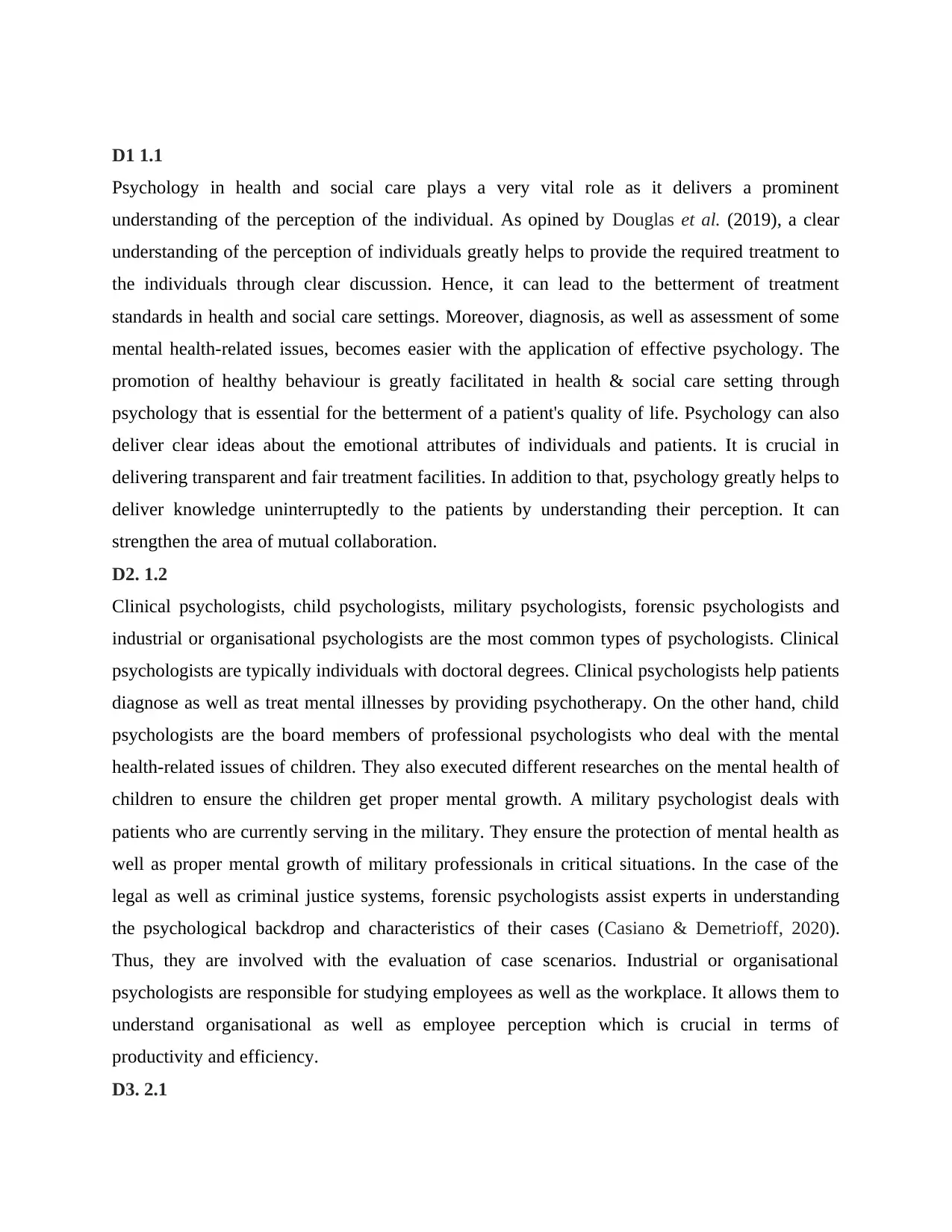
D1 1.1
Psychology in health and social care plays a very vital role as it delivers a prominent
understanding of the perception of the individual. As opined by Douglas et al. (2019), a clear
understanding of the perception of individuals greatly helps to provide the required treatment to
the individuals through clear discussion. Hence, it can lead to the betterment of treatment
standards in health and social care settings. Moreover, diagnosis, as well as assessment of some
mental health-related issues, becomes easier with the application of effective psychology. The
promotion of healthy behaviour is greatly facilitated in health & social care setting through
psychology that is essential for the betterment of a patient's quality of life. Psychology can also
deliver clear ideas about the emotional attributes of individuals and patients. It is crucial in
delivering transparent and fair treatment facilities. In addition to that, psychology greatly helps to
deliver knowledge uninterruptedly to the patients by understanding their perception. It can
strengthen the area of mutual collaboration.
D2. 1.2
Clinical psychologists, child psychologists, military psychologists, forensic psychologists and
industrial or organisational psychologists are the most common types of psychologists. Clinical
psychologists are typically individuals with doctoral degrees. Clinical psychologists help patients
diagnose as well as treat mental illnesses by providing psychotherapy. On the other hand, child
psychologists are the board members of professional psychologists who deal with the mental
health-related issues of children. They also executed different researches on the mental health of
children to ensure the children get proper mental growth. A military psychologist deals with
patients who are currently serving in the military. They ensure the protection of mental health as
well as proper mental growth of military professionals in critical situations. In the case of the
legal as well as criminal justice systems, forensic psychologists assist experts in understanding
the psychological backdrop and characteristics of their cases (Casiano & Demetrioff, 2020).
Thus, they are involved with the evaluation of case scenarios. Industrial or organisational
psychologists are responsible for studying employees as well as the workplace. It allows them to
understand organisational as well as employee perception which is crucial in terms of
productivity and efficiency.
D3. 2.1
Psychology in health and social care plays a very vital role as it delivers a prominent
understanding of the perception of the individual. As opined by Douglas et al. (2019), a clear
understanding of the perception of individuals greatly helps to provide the required treatment to
the individuals through clear discussion. Hence, it can lead to the betterment of treatment
standards in health and social care settings. Moreover, diagnosis, as well as assessment of some
mental health-related issues, becomes easier with the application of effective psychology. The
promotion of healthy behaviour is greatly facilitated in health & social care setting through
psychology that is essential for the betterment of a patient's quality of life. Psychology can also
deliver clear ideas about the emotional attributes of individuals and patients. It is crucial in
delivering transparent and fair treatment facilities. In addition to that, psychology greatly helps to
deliver knowledge uninterruptedly to the patients by understanding their perception. It can
strengthen the area of mutual collaboration.
D2. 1.2
Clinical psychologists, child psychologists, military psychologists, forensic psychologists and
industrial or organisational psychologists are the most common types of psychologists. Clinical
psychologists are typically individuals with doctoral degrees. Clinical psychologists help patients
diagnose as well as treat mental illnesses by providing psychotherapy. On the other hand, child
psychologists are the board members of professional psychologists who deal with the mental
health-related issues of children. They also executed different researches on the mental health of
children to ensure the children get proper mental growth. A military psychologist deals with
patients who are currently serving in the military. They ensure the protection of mental health as
well as proper mental growth of military professionals in critical situations. In the case of the
legal as well as criminal justice systems, forensic psychologists assist experts in understanding
the psychological backdrop and characteristics of their cases (Casiano & Demetrioff, 2020).
Thus, they are involved with the evaluation of case scenarios. Industrial or organisational
psychologists are responsible for studying employees as well as the workplace. It allows them to
understand organisational as well as employee perception which is crucial in terms of
productivity and efficiency.
D3. 2.1
Paraphrase This Document
Need a fresh take? Get an instant paraphrase of this document with our AI Paraphraser
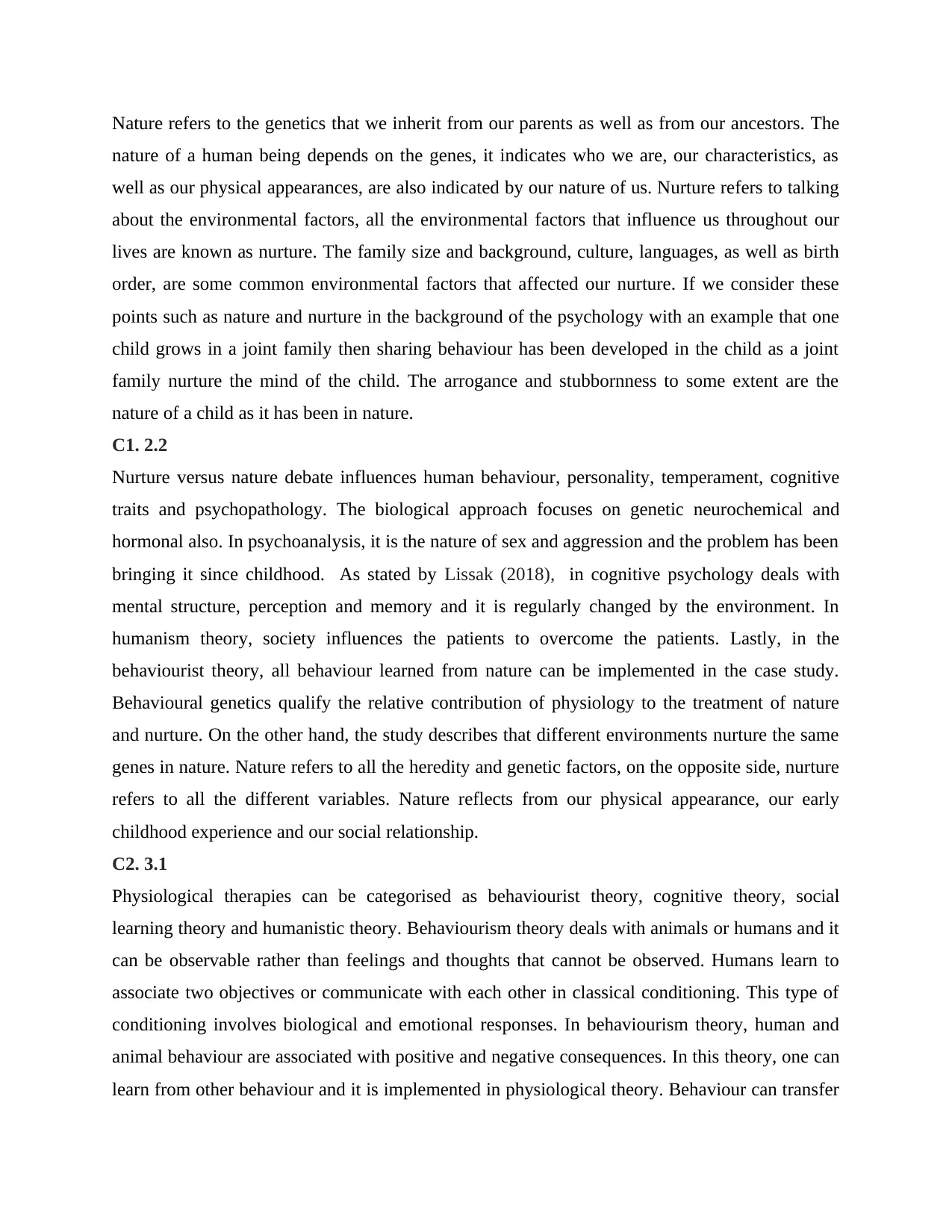
Nature refers to the genetics that we inherit from our parents as well as from our ancestors. The
nature of a human being depends on the genes, it indicates who we are, our characteristics, as
well as our physical appearances, are also indicated by our nature of us. Nurture refers to talking
about the environmental factors, all the environmental factors that influence us throughout our
lives are known as nurture. The family size and background, culture, languages, as well as birth
order, are some common environmental factors that affected our nurture. If we consider these
points such as nature and nurture in the background of the psychology with an example that one
child grows in a joint family then sharing behaviour has been developed in the child as a joint
family nurture the mind of the child. The arrogance and stubbornness to some extent are the
nature of a child as it has been in nature.
C1. 2.2
Nurture versus nature debate influences human behaviour, personality, temperament, cognitive
traits and psychopathology. The biological approach focuses on genetic neurochemical and
hormonal also. In psychoanalysis, it is the nature of sex and aggression and the problem has been
bringing it since childhood. As stated by Lissak (2018), in cognitive psychology deals with
mental structure, perception and memory and it is regularly changed by the environment. In
humanism theory, society influences the patients to overcome the patients. Lastly, in the
behaviourist theory, all behaviour learned from nature can be implemented in the case study.
Behavioural genetics qualify the relative contribution of physiology to the treatment of nature
and nurture. On the other hand, the study describes that different environments nurture the same
genes in nature. Nature refers to all the heredity and genetic factors, on the opposite side, nurture
refers to all the different variables. Nature reflects from our physical appearance, our early
childhood experience and our social relationship.
C2. 3.1
Physiological therapies can be categorised as behaviourist theory, cognitive theory, social
learning theory and humanistic theory. Behaviourism theory deals with animals or humans and it
can be observable rather than feelings and thoughts that cannot be observed. Humans learn to
associate two objectives or communicate with each other in classical conditioning. This type of
conditioning involves biological and emotional responses. In behaviourism theory, human and
animal behaviour are associated with positive and negative consequences. In this theory, one can
learn from other behaviour and it is implemented in physiological theory. Behaviour can transfer
nature of a human being depends on the genes, it indicates who we are, our characteristics, as
well as our physical appearances, are also indicated by our nature of us. Nurture refers to talking
about the environmental factors, all the environmental factors that influence us throughout our
lives are known as nurture. The family size and background, culture, languages, as well as birth
order, are some common environmental factors that affected our nurture. If we consider these
points such as nature and nurture in the background of the psychology with an example that one
child grows in a joint family then sharing behaviour has been developed in the child as a joint
family nurture the mind of the child. The arrogance and stubbornness to some extent are the
nature of a child as it has been in nature.
C1. 2.2
Nurture versus nature debate influences human behaviour, personality, temperament, cognitive
traits and psychopathology. The biological approach focuses on genetic neurochemical and
hormonal also. In psychoanalysis, it is the nature of sex and aggression and the problem has been
bringing it since childhood. As stated by Lissak (2018), in cognitive psychology deals with
mental structure, perception and memory and it is regularly changed by the environment. In
humanism theory, society influences the patients to overcome the patients. Lastly, in the
behaviourist theory, all behaviour learned from nature can be implemented in the case study.
Behavioural genetics qualify the relative contribution of physiology to the treatment of nature
and nurture. On the other hand, the study describes that different environments nurture the same
genes in nature. Nature refers to all the heredity and genetic factors, on the opposite side, nurture
refers to all the different variables. Nature reflects from our physical appearance, our early
childhood experience and our social relationship.
C2. 3.1
Physiological therapies can be categorised as behaviourist theory, cognitive theory, social
learning theory and humanistic theory. Behaviourism theory deals with animals or humans and it
can be observable rather than feelings and thoughts that cannot be observed. Humans learn to
associate two objectives or communicate with each other in classical conditioning. This type of
conditioning involves biological and emotional responses. In behaviourism theory, human and
animal behaviour are associated with positive and negative consequences. In this theory, one can
learn from other behaviour and it is implemented in physiological theory. Behaviour can transfer
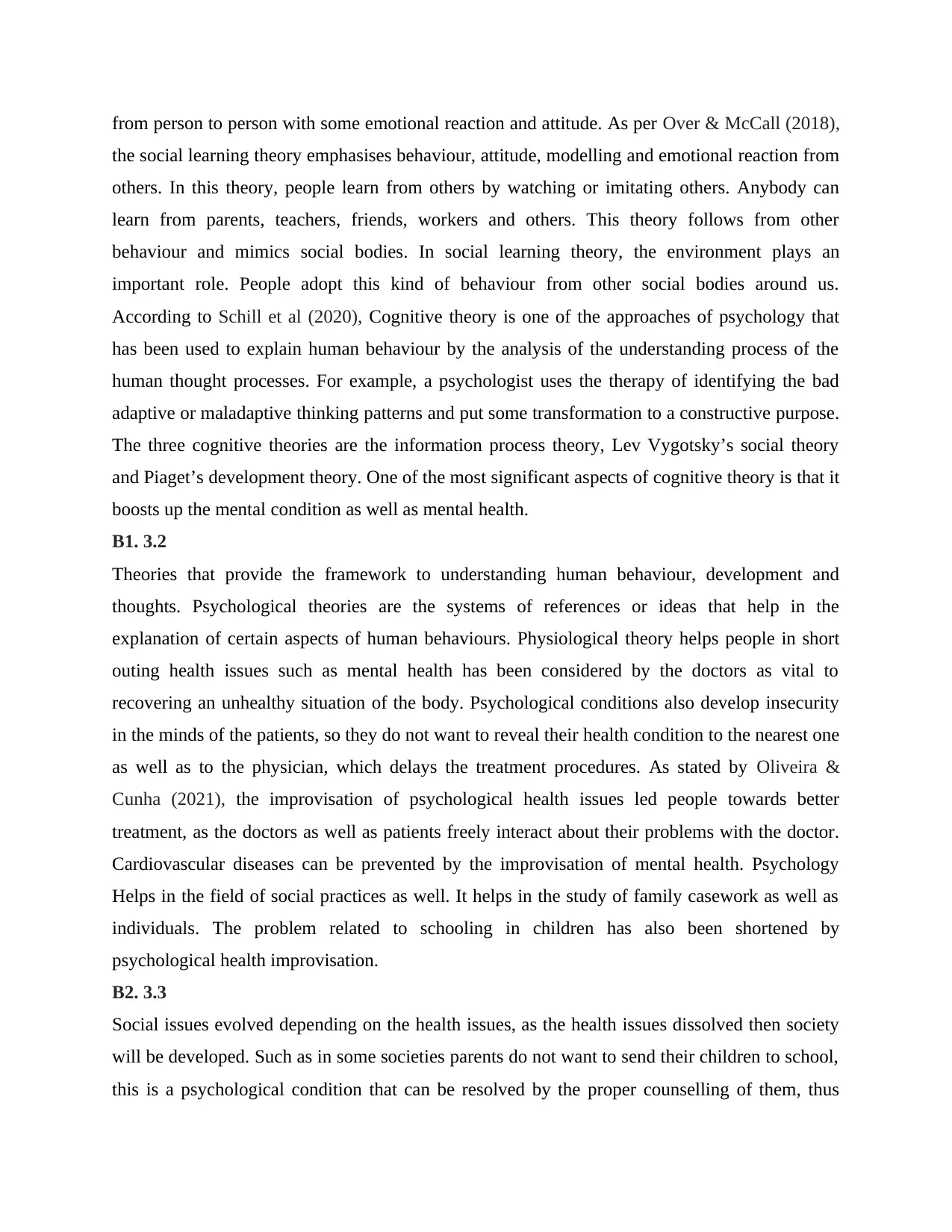
from person to person with some emotional reaction and attitude. As per Over & McCall (2018),
the social learning theory emphasises behaviour, attitude, modelling and emotional reaction from
others. In this theory, people learn from others by watching or imitating others. Anybody can
learn from parents, teachers, friends, workers and others. This theory follows from other
behaviour and mimics social bodies. In social learning theory, the environment plays an
important role. People adopt this kind of behaviour from other social bodies around us.
According to Schill et al (2020), Cognitive theory is one of the approaches of psychology that
has been used to explain human behaviour by the analysis of the understanding process of the
human thought processes. For example, a psychologist uses the therapy of identifying the bad
adaptive or maladaptive thinking patterns and put some transformation to a constructive purpose.
The three cognitive theories are the information process theory, Lev Vygotsky’s social theory
and Piaget’s development theory. One of the most significant aspects of cognitive theory is that it
boosts up the mental condition as well as mental health.
B1. 3.2
Theories that provide the framework to understanding human behaviour, development and
thoughts. Psychological theories are the systems of references or ideas that help in the
explanation of certain aspects of human behaviours. Physiological theory helps people in short
outing health issues such as mental health has been considered by the doctors as vital to
recovering an unhealthy situation of the body. Psychological conditions also develop insecurity
in the minds of the patients, so they do not want to reveal their health condition to the nearest one
as well as to the physician, which delays the treatment procedures. As stated by Oliveira &
Cunha (2021), the improvisation of psychological health issues led people towards better
treatment, as the doctors as well as patients freely interact about their problems with the doctor.
Cardiovascular diseases can be prevented by the improvisation of mental health. Psychology
Helps in the field of social practices as well. It helps in the study of family casework as well as
individuals. The problem related to schooling in children has also been shortened by
psychological health improvisation.
B2. 3.3
Social issues evolved depending on the health issues, as the health issues dissolved then society
will be developed. Such as in some societies parents do not want to send their children to school,
this is a psychological condition that can be resolved by the proper counselling of them, thus
the social learning theory emphasises behaviour, attitude, modelling and emotional reaction from
others. In this theory, people learn from others by watching or imitating others. Anybody can
learn from parents, teachers, friends, workers and others. This theory follows from other
behaviour and mimics social bodies. In social learning theory, the environment plays an
important role. People adopt this kind of behaviour from other social bodies around us.
According to Schill et al (2020), Cognitive theory is one of the approaches of psychology that
has been used to explain human behaviour by the analysis of the understanding process of the
human thought processes. For example, a psychologist uses the therapy of identifying the bad
adaptive or maladaptive thinking patterns and put some transformation to a constructive purpose.
The three cognitive theories are the information process theory, Lev Vygotsky’s social theory
and Piaget’s development theory. One of the most significant aspects of cognitive theory is that it
boosts up the mental condition as well as mental health.
B1. 3.2
Theories that provide the framework to understanding human behaviour, development and
thoughts. Psychological theories are the systems of references or ideas that help in the
explanation of certain aspects of human behaviours. Physiological theory helps people in short
outing health issues such as mental health has been considered by the doctors as vital to
recovering an unhealthy situation of the body. Psychological conditions also develop insecurity
in the minds of the patients, so they do not want to reveal their health condition to the nearest one
as well as to the physician, which delays the treatment procedures. As stated by Oliveira &
Cunha (2021), the improvisation of psychological health issues led people towards better
treatment, as the doctors as well as patients freely interact about their problems with the doctor.
Cardiovascular diseases can be prevented by the improvisation of mental health. Psychology
Helps in the field of social practices as well. It helps in the study of family casework as well as
individuals. The problem related to schooling in children has also been shortened by
psychological health improvisation.
B2. 3.3
Social issues evolved depending on the health issues, as the health issues dissolved then society
will be developed. Such as in some societies parents do not want to send their children to school,
this is a psychological condition that can be resolved by the proper counselling of them, thus
⊘ This is a preview!⊘
Do you want full access?
Subscribe today to unlock all pages.

Trusted by 1+ million students worldwide
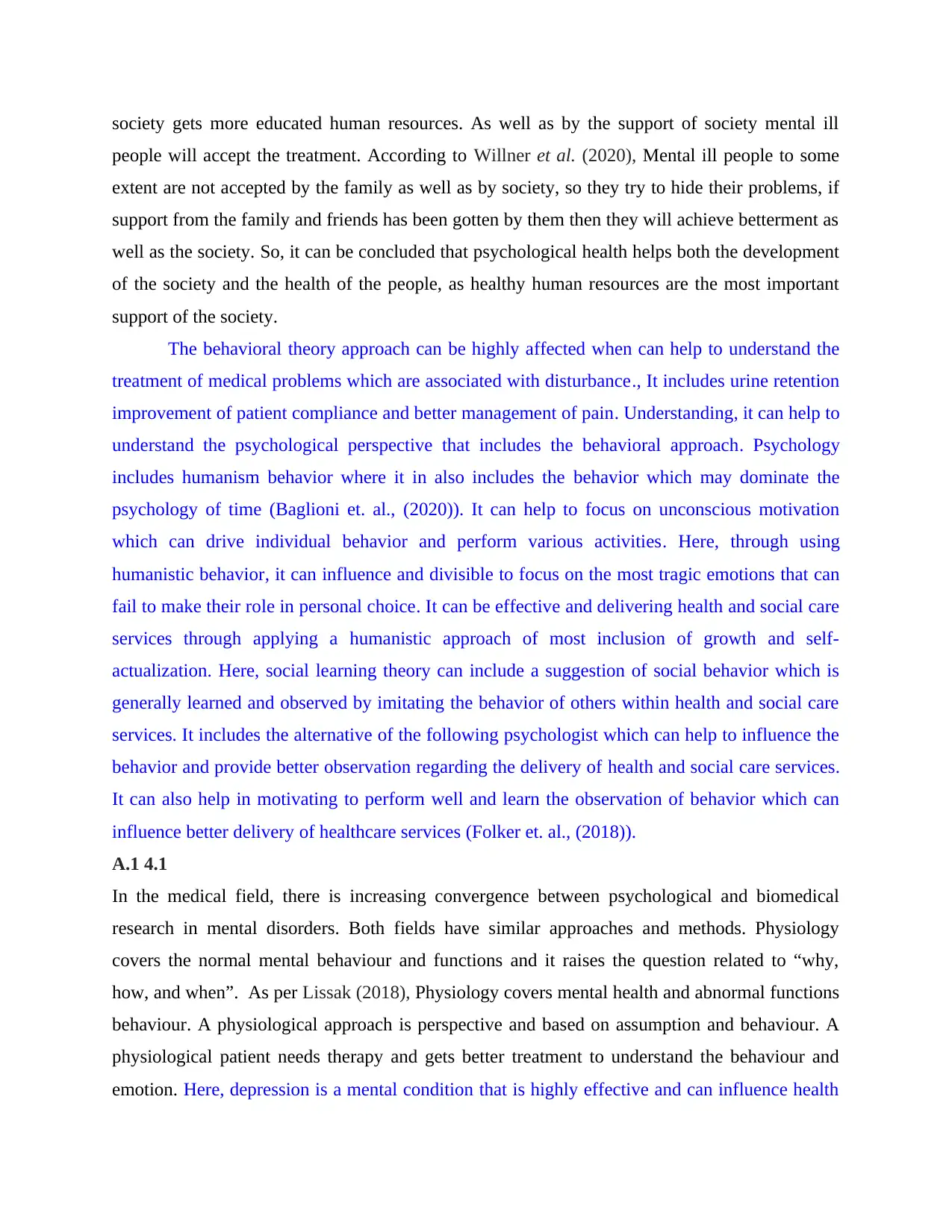
society gets more educated human resources. As well as by the support of society mental ill
people will accept the treatment. According to Willner et al. (2020), Mental ill people to some
extent are not accepted by the family as well as by society, so they try to hide their problems, if
support from the family and friends has been gotten by them then they will achieve betterment as
well as the society. So, it can be concluded that psychological health helps both the development
of the society and the health of the people, as healthy human resources are the most important
support of the society.
The behavioral theory approach can be highly affected when can help to understand the
treatment of medical problems which are associated with disturbance., It includes urine retention
improvement of patient compliance and better management of pain. Understanding, it can help to
understand the psychological perspective that includes the behavioral approach. Psychology
includes humanism behavior where it in also includes the behavior which may dominate the
psychology of time (Baglioni et. al., (2020)). It can help to focus on unconscious motivation
which can drive individual behavior and perform various activities. Here, through using
humanistic behavior, it can influence and divisible to focus on the most tragic emotions that can
fail to make their role in personal choice. It can be effective and delivering health and social care
services through applying a humanistic approach of most inclusion of growth and self-
actualization. Here, social learning theory can include a suggestion of social behavior which is
generally learned and observed by imitating the behavior of others within health and social care
services. It includes the alternative of the following psychologist which can help to influence the
behavior and provide better observation regarding the delivery of health and social care services.
It can also help in motivating to perform well and learn the observation of behavior which can
influence better delivery of healthcare services (Folker et. al., (2018)).
A.1 4.1
In the medical field, there is increasing convergence between psychological and biomedical
research in mental disorders. Both fields have similar approaches and methods. Physiology
covers the normal mental behaviour and functions and it raises the question related to “why,
how, and when”. As per Lissak (2018), Physiology covers mental health and abnormal functions
behaviour. A physiological approach is perspective and based on assumption and behaviour. A
physiological patient needs therapy and gets better treatment to understand the behaviour and
emotion. Here, depression is a mental condition that is highly effective and can influence health
people will accept the treatment. According to Willner et al. (2020), Mental ill people to some
extent are not accepted by the family as well as by society, so they try to hide their problems, if
support from the family and friends has been gotten by them then they will achieve betterment as
well as the society. So, it can be concluded that psychological health helps both the development
of the society and the health of the people, as healthy human resources are the most important
support of the society.
The behavioral theory approach can be highly affected when can help to understand the
treatment of medical problems which are associated with disturbance., It includes urine retention
improvement of patient compliance and better management of pain. Understanding, it can help to
understand the psychological perspective that includes the behavioral approach. Psychology
includes humanism behavior where it in also includes the behavior which may dominate the
psychology of time (Baglioni et. al., (2020)). It can help to focus on unconscious motivation
which can drive individual behavior and perform various activities. Here, through using
humanistic behavior, it can influence and divisible to focus on the most tragic emotions that can
fail to make their role in personal choice. It can be effective and delivering health and social care
services through applying a humanistic approach of most inclusion of growth and self-
actualization. Here, social learning theory can include a suggestion of social behavior which is
generally learned and observed by imitating the behavior of others within health and social care
services. It includes the alternative of the following psychologist which can help to influence the
behavior and provide better observation regarding the delivery of health and social care services.
It can also help in motivating to perform well and learn the observation of behavior which can
influence better delivery of healthcare services (Folker et. al., (2018)).
A.1 4.1
In the medical field, there is increasing convergence between psychological and biomedical
research in mental disorders. Both fields have similar approaches and methods. Physiology
covers the normal mental behaviour and functions and it raises the question related to “why,
how, and when”. As per Lissak (2018), Physiology covers mental health and abnormal functions
behaviour. A physiological approach is perspective and based on assumption and behaviour. A
physiological patient needs therapy and gets better treatment to understand the behaviour and
emotion. Here, depression is a mental condition that is highly effective and can influence health
Paraphrase This Document
Need a fresh take? Get an instant paraphrase of this document with our AI Paraphraser
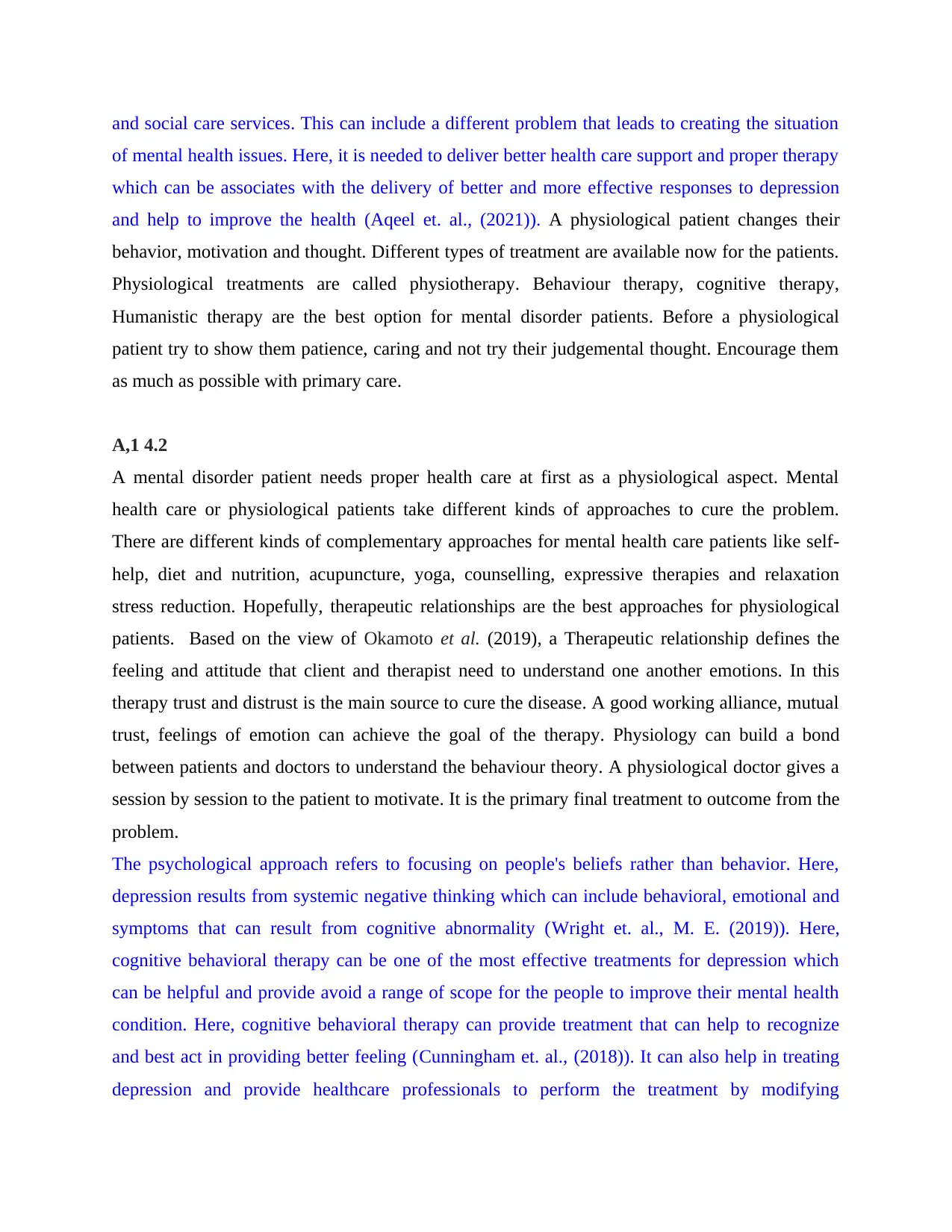
and social care services. This can include a different problem that leads to creating the situation
of mental health issues. Here, it is needed to deliver better health care support and proper therapy
which can be associates with the delivery of better and more effective responses to depression
and help to improve the health (Aqeel et. al., (2021)). A physiological patient changes their
behavior, motivation and thought. Different types of treatment are available now for the patients.
Physiological treatments are called physiotherapy. Behaviour therapy, cognitive therapy,
Humanistic therapy are the best option for mental disorder patients. Before a physiological
patient try to show them patience, caring and not try their judgemental thought. Encourage them
as much as possible with primary care.
A,1 4.2
A mental disorder patient needs proper health care at first as a physiological aspect. Mental
health care or physiological patients take different kinds of approaches to cure the problem.
There are different kinds of complementary approaches for mental health care patients like self-
help, diet and nutrition, acupuncture, yoga, counselling, expressive therapies and relaxation
stress reduction. Hopefully, therapeutic relationships are the best approaches for physiological
patients. Based on the view of Okamoto et al. (2019), a Therapeutic relationship defines the
feeling and attitude that client and therapist need to understand one another emotions. In this
therapy trust and distrust is the main source to cure the disease. A good working alliance, mutual
trust, feelings of emotion can achieve the goal of the therapy. Physiology can build a bond
between patients and doctors to understand the behaviour theory. A physiological doctor gives a
session by session to the patient to motivate. It is the primary final treatment to outcome from the
problem.
The psychological approach refers to focusing on people's beliefs rather than behavior. Here,
depression results from systemic negative thinking which can include behavioral, emotional and
symptoms that can result from cognitive abnormality (Wright et. al., M. E. (2019)). Here,
cognitive behavioral therapy can be one of the most effective treatments for depression which
can be helpful and provide avoid a range of scope for the people to improve their mental health
condition. Here, cognitive behavioral therapy can provide treatment that can help to recognize
and best act in providing better feeling (Cunningham et. al., (2018)). It can also help in treating
depression and provide healthcare professionals to perform the treatment by modifying
of mental health issues. Here, it is needed to deliver better health care support and proper therapy
which can be associates with the delivery of better and more effective responses to depression
and help to improve the health (Aqeel et. al., (2021)). A physiological patient changes their
behavior, motivation and thought. Different types of treatment are available now for the patients.
Physiological treatments are called physiotherapy. Behaviour therapy, cognitive therapy,
Humanistic therapy are the best option for mental disorder patients. Before a physiological
patient try to show them patience, caring and not try their judgemental thought. Encourage them
as much as possible with primary care.
A,1 4.2
A mental disorder patient needs proper health care at first as a physiological aspect. Mental
health care or physiological patients take different kinds of approaches to cure the problem.
There are different kinds of complementary approaches for mental health care patients like self-
help, diet and nutrition, acupuncture, yoga, counselling, expressive therapies and relaxation
stress reduction. Hopefully, therapeutic relationships are the best approaches for physiological
patients. Based on the view of Okamoto et al. (2019), a Therapeutic relationship defines the
feeling and attitude that client and therapist need to understand one another emotions. In this
therapy trust and distrust is the main source to cure the disease. A good working alliance, mutual
trust, feelings of emotion can achieve the goal of the therapy. Physiology can build a bond
between patients and doctors to understand the behaviour theory. A physiological doctor gives a
session by session to the patient to motivate. It is the primary final treatment to outcome from the
problem.
The psychological approach refers to focusing on people's beliefs rather than behavior. Here,
depression results from systemic negative thinking which can include behavioral, emotional and
symptoms that can result from cognitive abnormality (Wright et. al., M. E. (2019)). Here,
cognitive behavioral therapy can be one of the most effective treatments for depression which
can be helpful and provide avoid a range of scope for the people to improve their mental health
condition. Here, cognitive behavioral therapy can provide treatment that can help to recognize
and best act in providing better feeling (Cunningham et. al., (2018)). It can also help in treating
depression and provide healthcare professionals to perform the treatment by modifying
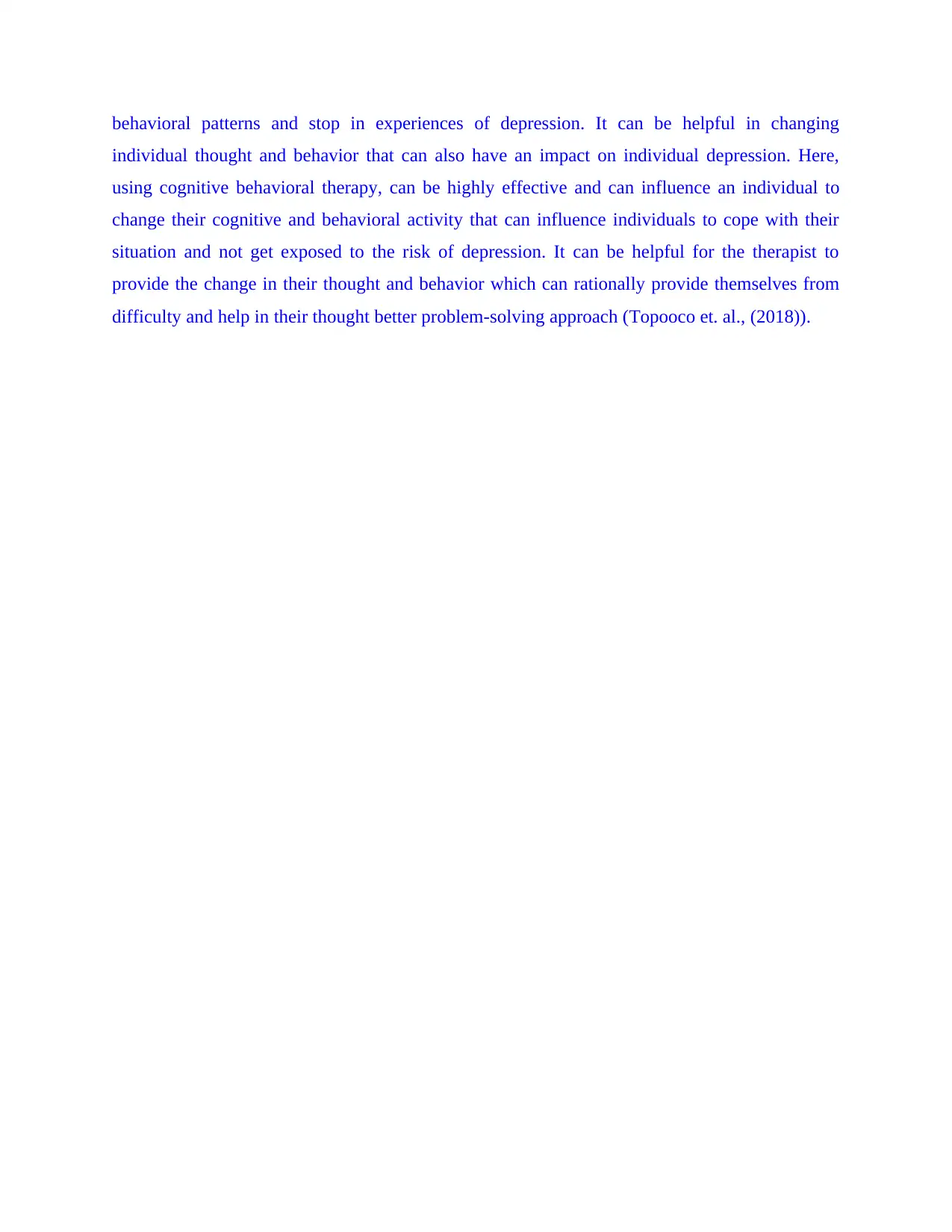
behavioral patterns and stop in experiences of depression. It can be helpful in changing
individual thought and behavior that can also have an impact on individual depression. Here,
using cognitive behavioral therapy, can be highly effective and can influence an individual to
change their cognitive and behavioral activity that can influence individuals to cope with their
situation and not get exposed to the risk of depression. It can be helpful for the therapist to
provide the change in their thought and behavior which can rationally provide themselves from
difficulty and help in their thought better problem-solving approach (Topooco et. al., (2018)).
individual thought and behavior that can also have an impact on individual depression. Here,
using cognitive behavioral therapy, can be highly effective and can influence an individual to
change their cognitive and behavioral activity that can influence individuals to cope with their
situation and not get exposed to the risk of depression. It can be helpful for the therapist to
provide the change in their thought and behavior which can rationally provide themselves from
difficulty and help in their thought better problem-solving approach (Topooco et. al., (2018)).
⊘ This is a preview!⊘
Do you want full access?
Subscribe today to unlock all pages.

Trusted by 1+ million students worldwide
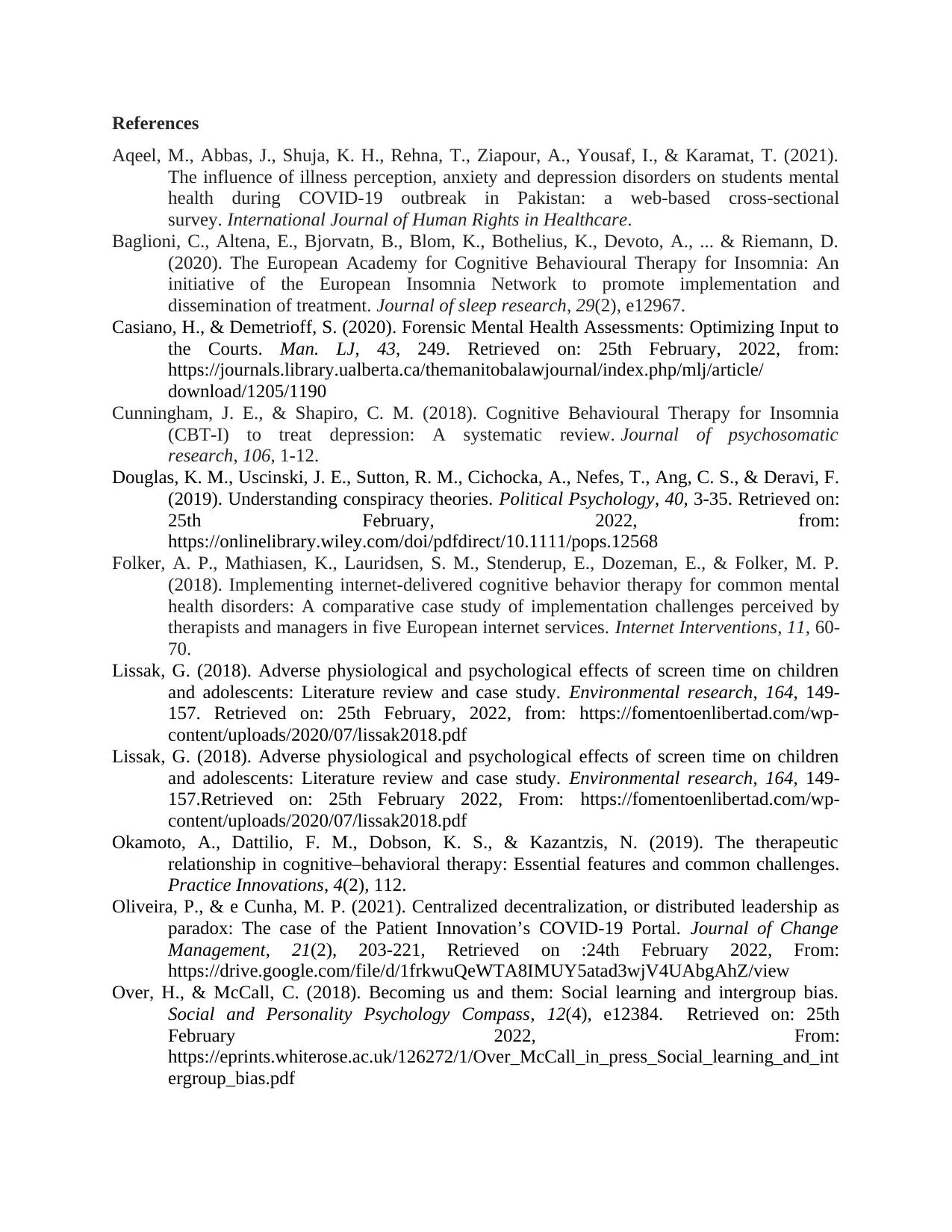
References
Aqeel, M., Abbas, J., Shuja, K. H., Rehna, T., Ziapour, A., Yousaf, I., & Karamat, T. (2021).
The influence of illness perception, anxiety and depression disorders on students mental
health during COVID-19 outbreak in Pakistan: a web-based cross-sectional
survey. International Journal of Human Rights in Healthcare.
Baglioni, C., Altena, E., Bjorvatn, B., Blom, K., Bothelius, K., Devoto, A., ... & Riemann, D.
(2020). The European Academy for Cognitive Behavioural Therapy for Insomnia: An
initiative of the European Insomnia Network to promote implementation and
dissemination of treatment. Journal of sleep research, 29(2), e12967.
Casiano, H., & Demetrioff, S. (2020). Forensic Mental Health Assessments: Optimizing Input to
the Courts. Man. LJ, 43, 249. Retrieved on: 25th February, 2022, from:
https://journals.library.ualberta.ca/themanitobalawjournal/index.php/mlj/article/
download/1205/1190
Cunningham, J. E., & Shapiro, C. M. (2018). Cognitive Behavioural Therapy for Insomnia
(CBT-I) to treat depression: A systematic review. Journal of psychosomatic
research, 106, 1-12.
Douglas, K. M., Uscinski, J. E., Sutton, R. M., Cichocka, A., Nefes, T., Ang, C. S., & Deravi, F.
(2019). Understanding conspiracy theories. Political Psychology, 40, 3-35. Retrieved on:
25th February, 2022, from:
https://onlinelibrary.wiley.com/doi/pdfdirect/10.1111/pops.12568
Folker, A. P., Mathiasen, K., Lauridsen, S. M., Stenderup, E., Dozeman, E., & Folker, M. P.
(2018). Implementing internet-delivered cognitive behavior therapy for common mental
health disorders: A comparative case study of implementation challenges perceived by
therapists and managers in five European internet services. Internet Interventions, 11, 60-
70.
Lissak, G. (2018). Adverse physiological and psychological effects of screen time on children
and adolescents: Literature review and case study. Environmental research, 164, 149-
157. Retrieved on: 25th February, 2022, from: https://fomentoenlibertad.com/wp-
content/uploads/2020/07/lissak2018.pdf
Lissak, G. (2018). Adverse physiological and psychological effects of screen time on children
and adolescents: Literature review and case study. Environmental research, 164, 149-
157.Retrieved on: 25th February 2022, From: https://fomentoenlibertad.com/wp-
content/uploads/2020/07/lissak2018.pdf
Okamoto, A., Dattilio, F. M., Dobson, K. S., & Kazantzis, N. (2019). The therapeutic
relationship in cognitive–behavioral therapy: Essential features and common challenges.
Practice Innovations, 4(2), 112.
Oliveira, P., & e Cunha, M. P. (2021). Centralized decentralization, or distributed leadership as
paradox: The case of the Patient Innovation’s COVID-19 Portal. Journal of Change
Management, 21(2), 203-221, Retrieved on :24th February 2022, From:
https://drive.google.com/file/d/1frkwuQeWTA8IMUY5atad3wjV4UAbgAhZ/view
Over, H., & McCall, C. (2018). Becoming us and them: Social learning and intergroup bias.
Social and Personality Psychology Compass, 12(4), e12384. Retrieved on: 25th
February 2022, From:
https://eprints.whiterose.ac.uk/126272/1/Over_McCall_in_press_Social_learning_and_int
ergroup_bias.pdf
Aqeel, M., Abbas, J., Shuja, K. H., Rehna, T., Ziapour, A., Yousaf, I., & Karamat, T. (2021).
The influence of illness perception, anxiety and depression disorders on students mental
health during COVID-19 outbreak in Pakistan: a web-based cross-sectional
survey. International Journal of Human Rights in Healthcare.
Baglioni, C., Altena, E., Bjorvatn, B., Blom, K., Bothelius, K., Devoto, A., ... & Riemann, D.
(2020). The European Academy for Cognitive Behavioural Therapy for Insomnia: An
initiative of the European Insomnia Network to promote implementation and
dissemination of treatment. Journal of sleep research, 29(2), e12967.
Casiano, H., & Demetrioff, S. (2020). Forensic Mental Health Assessments: Optimizing Input to
the Courts. Man. LJ, 43, 249. Retrieved on: 25th February, 2022, from:
https://journals.library.ualberta.ca/themanitobalawjournal/index.php/mlj/article/
download/1205/1190
Cunningham, J. E., & Shapiro, C. M. (2018). Cognitive Behavioural Therapy for Insomnia
(CBT-I) to treat depression: A systematic review. Journal of psychosomatic
research, 106, 1-12.
Douglas, K. M., Uscinski, J. E., Sutton, R. M., Cichocka, A., Nefes, T., Ang, C. S., & Deravi, F.
(2019). Understanding conspiracy theories. Political Psychology, 40, 3-35. Retrieved on:
25th February, 2022, from:
https://onlinelibrary.wiley.com/doi/pdfdirect/10.1111/pops.12568
Folker, A. P., Mathiasen, K., Lauridsen, S. M., Stenderup, E., Dozeman, E., & Folker, M. P.
(2018). Implementing internet-delivered cognitive behavior therapy for common mental
health disorders: A comparative case study of implementation challenges perceived by
therapists and managers in five European internet services. Internet Interventions, 11, 60-
70.
Lissak, G. (2018). Adverse physiological and psychological effects of screen time on children
and adolescents: Literature review and case study. Environmental research, 164, 149-
157. Retrieved on: 25th February, 2022, from: https://fomentoenlibertad.com/wp-
content/uploads/2020/07/lissak2018.pdf
Lissak, G. (2018). Adverse physiological and psychological effects of screen time on children
and adolescents: Literature review and case study. Environmental research, 164, 149-
157.Retrieved on: 25th February 2022, From: https://fomentoenlibertad.com/wp-
content/uploads/2020/07/lissak2018.pdf
Okamoto, A., Dattilio, F. M., Dobson, K. S., & Kazantzis, N. (2019). The therapeutic
relationship in cognitive–behavioral therapy: Essential features and common challenges.
Practice Innovations, 4(2), 112.
Oliveira, P., & e Cunha, M. P. (2021). Centralized decentralization, or distributed leadership as
paradox: The case of the Patient Innovation’s COVID-19 Portal. Journal of Change
Management, 21(2), 203-221, Retrieved on :24th February 2022, From:
https://drive.google.com/file/d/1frkwuQeWTA8IMUY5atad3wjV4UAbgAhZ/view
Over, H., & McCall, C. (2018). Becoming us and them: Social learning and intergroup bias.
Social and Personality Psychology Compass, 12(4), e12384. Retrieved on: 25th
February 2022, From:
https://eprints.whiterose.ac.uk/126272/1/Over_McCall_in_press_Social_learning_and_int
ergroup_bias.pdf
Paraphrase This Document
Need a fresh take? Get an instant paraphrase of this document with our AI Paraphraser
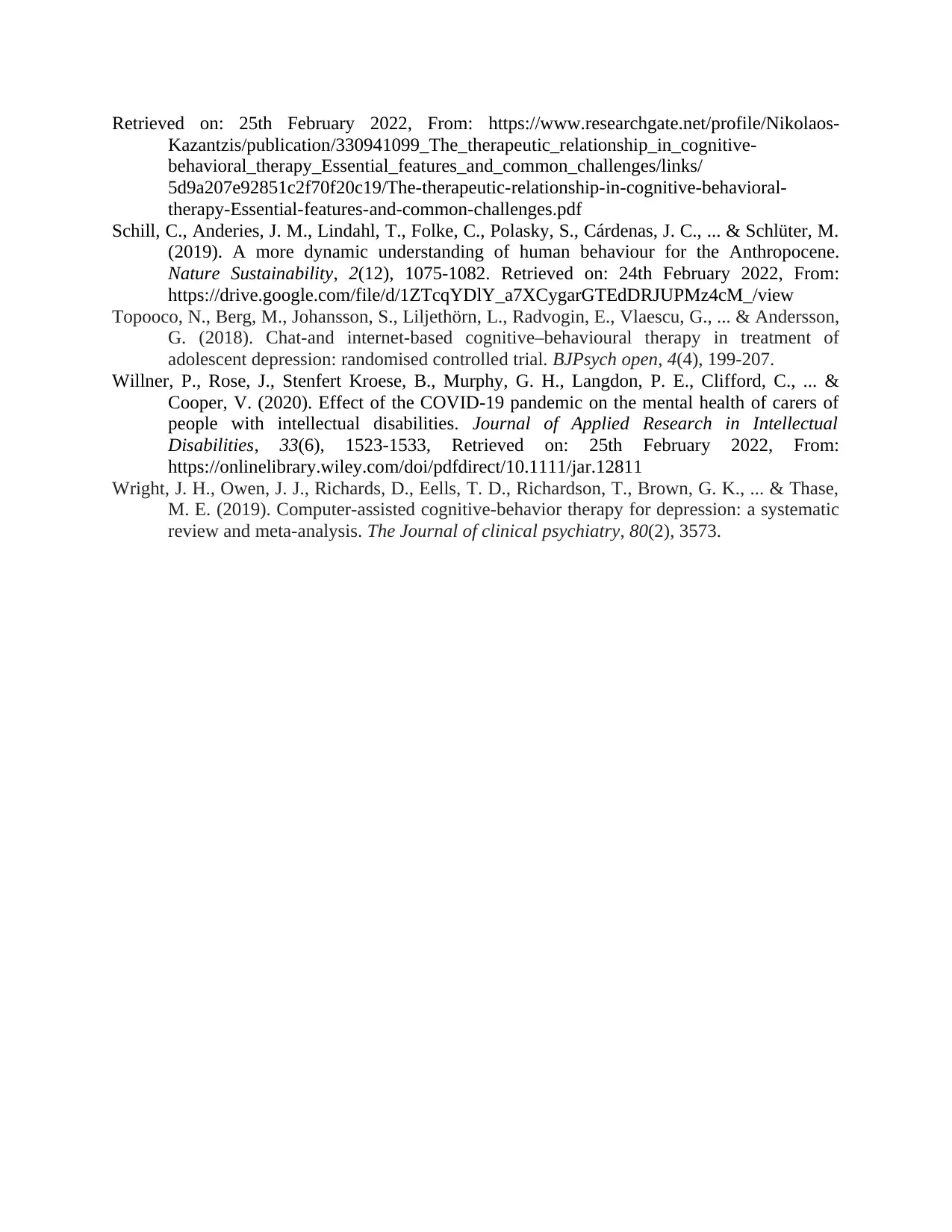
Retrieved on: 25th February 2022, From: https://www.researchgate.net/profile/Nikolaos-
Kazantzis/publication/330941099_The_therapeutic_relationship_in_cognitive-
behavioral_therapy_Essential_features_and_common_challenges/links/
5d9a207e92851c2f70f20c19/The-therapeutic-relationship-in-cognitive-behavioral-
therapy-Essential-features-and-common-challenges.pdf
Schill, C., Anderies, J. M., Lindahl, T., Folke, C., Polasky, S., Cárdenas, J. C., ... & Schlüter, M.
(2019). A more dynamic understanding of human behaviour for the Anthropocene.
Nature Sustainability, 2(12), 1075-1082. Retrieved on: 24th February 2022, From:
https://drive.google.com/file/d/1ZTcqYDlY_a7XCygarGTEdDRJUPMz4cM_/view
Topooco, N., Berg, M., Johansson, S., Liljethörn, L., Radvogin, E., Vlaescu, G., ... & Andersson,
G. (2018). Chat-and internet-based cognitive–behavioural therapy in treatment of
adolescent depression: randomised controlled trial. BJPsych open, 4(4), 199-207.
Willner, P., Rose, J., Stenfert Kroese, B., Murphy, G. H., Langdon, P. E., Clifford, C., ... &
Cooper, V. (2020). Effect of the COVID‐19 pandemic on the mental health of carers of
people with intellectual disabilities. Journal of Applied Research in Intellectual
Disabilities, 33(6), 1523-1533, Retrieved on: 25th February 2022, From:
https://onlinelibrary.wiley.com/doi/pdfdirect/10.1111/jar.12811
Wright, J. H., Owen, J. J., Richards, D., Eells, T. D., Richardson, T., Brown, G. K., ... & Thase,
M. E. (2019). Computer-assisted cognitive-behavior therapy for depression: a systematic
review and meta-analysis. The Journal of clinical psychiatry, 80(2), 3573.
Kazantzis/publication/330941099_The_therapeutic_relationship_in_cognitive-
behavioral_therapy_Essential_features_and_common_challenges/links/
5d9a207e92851c2f70f20c19/The-therapeutic-relationship-in-cognitive-behavioral-
therapy-Essential-features-and-common-challenges.pdf
Schill, C., Anderies, J. M., Lindahl, T., Folke, C., Polasky, S., Cárdenas, J. C., ... & Schlüter, M.
(2019). A more dynamic understanding of human behaviour for the Anthropocene.
Nature Sustainability, 2(12), 1075-1082. Retrieved on: 24th February 2022, From:
https://drive.google.com/file/d/1ZTcqYDlY_a7XCygarGTEdDRJUPMz4cM_/view
Topooco, N., Berg, M., Johansson, S., Liljethörn, L., Radvogin, E., Vlaescu, G., ... & Andersson,
G. (2018). Chat-and internet-based cognitive–behavioural therapy in treatment of
adolescent depression: randomised controlled trial. BJPsych open, 4(4), 199-207.
Willner, P., Rose, J., Stenfert Kroese, B., Murphy, G. H., Langdon, P. E., Clifford, C., ... &
Cooper, V. (2020). Effect of the COVID‐19 pandemic on the mental health of carers of
people with intellectual disabilities. Journal of Applied Research in Intellectual
Disabilities, 33(6), 1523-1533, Retrieved on: 25th February 2022, From:
https://onlinelibrary.wiley.com/doi/pdfdirect/10.1111/jar.12811
Wright, J. H., Owen, J. J., Richards, D., Eells, T. D., Richardson, T., Brown, G. K., ... & Thase,
M. E. (2019). Computer-assisted cognitive-behavior therapy for depression: a systematic
review and meta-analysis. The Journal of clinical psychiatry, 80(2), 3573.
1 out of 8
Related Documents
Your All-in-One AI-Powered Toolkit for Academic Success.
+13062052269
info@desklib.com
Available 24*7 on WhatsApp / Email
![[object Object]](/_next/static/media/star-bottom.7253800d.svg)
Unlock your academic potential
Copyright © 2020–2026 A2Z Services. All Rights Reserved. Developed and managed by ZUCOL.





